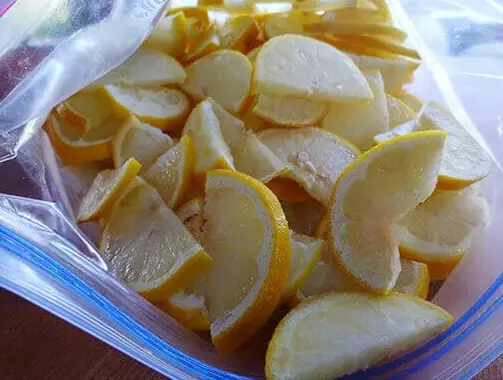Short answer: Yes, you can freeze lemon slices. Ensure they are properly stored in airtight containers or ziplock bags to prevent freezer burn.
Yes, you can indeed freeze lemon slices. This method of preservation not only extends their shelf life but also allows you to have lemon slices on hand anytime you need them. Whether you want to add a tangy touch to your drinks or zest up your culinary creations, frozen lemon slices are a convenient and efficient way to do so.
Freezing Lemon Slices: An Efficient Method of Preservation

Lemon slices can be frozen and this method serves as an excellent way to preserve their freshness and tangy flavor. This is particularly useful when you have an excess of lemons that you don’t want to waste. By freezing lemon slices, you ensure a year-round supply of this versatile citrus fruit, ready to be used in a myriad of culinary applications, from enhancing the taste of your drinks to adding zest to your favorite recipes.
How To Freeze Lemon Slices?
Method 1:
Step 1: Wash and dry fresh lemons.
Step 2: Cut off the ends of each lemon and place the ends in your compost pile.
Step 3: Cut each lemon in half lengthwise.

Step 4: Slice the halved lemons into thin pieces. Remember to be careful and avoid cutting your fingers.
Step 5: Once you have a sufficient number of lemon slices, place them in a Tupperware container or similar storage device.

Step 6: Before freezing the slices together lay them out on a tray or plate that fits in your freezer. This initial freezing step prevents the lemon slices from sticking to each other.

Step 7: Place the tray or plate of lemon slices in the freezer.
Step 8: After about an hour and a half, check the lemon slices. They should be completely frozen.
Step 9: Froze, and transfer the slices to the previously prepared Tupperware or similar container.
Step 10: Store the container with frozen lemon slices in the freezer.
Method 2:
Step 1: Slice the lemons into pieces, saving the ends for other uses like making zest or cleaning your cutting board.
Step 2: You could lay out these slices on a sheet pan and freeze them individually to prevent sticking, or you could directly move to the next step.
Step 3: Put the lemon slices into a plastic bag.
Step 4: Place the bag with the lemon slices in the freezer.
Step 5: Depending on your preference or need, you can also cut some of the lemon slices into halves or quarters. These smaller pieces are ideal for flavoring water.
Step 6: Keep the baggie of lemon slices in the freezer, and they should stay fresh for a long time.
Step 7: When you need some citrus in your drink, simply take out a slice, half, or quarter, and add it to your drink.

How To Freeze A Whole Lemon?
Step 1: To freeze a whole lemon, start by placing it into a resealable plastic bag. Push out as much air as you can from the bag before sealing it.
Step 2: Once sealed, place the bag containing the lemon into the freezer.
Step 3: To make frozen lemon slices, use a sharp knife to cut the lemons into slices.
Step 4: Lay these slices out on a cookie sheet and place them in the freezer for 2-3 hours until they are completely frozen.
Step 5: After the lemon slices have frozen completely, transfer them into a freezer-safe bag or container.
Step 6: Return the container or bag with the lemon slices to the freezer for storage.
How To Freeze Lemon Citrus?
Step 1: Start by zesting the lemons over a piece of parchment paper. Do this with a microplane, making sure to only scrape off the bright shiny part of the lemon, not the white part as it is bitter.
Step 2: Once you’re done zesting, spread out the zest a little bit on the parchment paper. Fold the parchment paper over and place it in a freezer-safe bag. Label the bag as ‘Lemon Zest’.
Step 3: Proceed to juice the zested lemons.
Step 4: Store the lemon juice in ice cube trays. Two ice cubes generally equate to a quarter cup of lemon juice, which is a convenient measurement for many recipes.
Step 5: Once the juice is frozen into solid cubes, transfer them into freezer-safe bags. Label these bags accordingly.
Step 6: Store both the zest and juice in the freezer. They can be used as needed in recipes, just like fresh lemon zest or juice.
Method 2:
Step 1: Cut the lemons in half.
Step 2: Use a lemon press to extract the juice.
Step 3: Pour the juice into an ice cube tray for freezing. Each cube can be roughly equal to two tablespoons of juice.
Step 4: Once frozen, you can use these lemon juice cubes anytime you need lemon juice for your drinks or recipes.
How To Freeze Lemon Zest?[/su_heading]
Step 1: When working with key limes or other types of citrus, you may end up with a lot of leftover zest. To avoid wasting this flavorful ingredient, the first step is to zest off the outer skin of the fruit.
Step 2: Remember that smaller citrus fruits like key limes may require more effort to obtain a significant amount of zest or juice due to their size, but their flavor is still worth it.
Step 3: After zesting, you may have a substantial amount of zest left over. If, for example, you buy a bag of lemons but only need the zest from two and the juice from the rest, don’t discard the remaining zest.
Step 4: Decide on the portion size you want to use for freezing the zest. It might be helpful to freeze it in portions that align with the amounts you commonly use in recipes. For example, one-tablespoon portions might be a good option.
Step 5: If you have a vacuum-sealing system, it’s a great tool to use for this step as it removes all the air from the bags. However, if you don’t have one, manually squeezing out as much air as possible works just fine.
Step 6: Once all the air is removed from the bag, seal it and place it in the freezer. It’s best to use the frozen zest within a month to ensure it maintains its fresh flavor.
Step 7: Freezing the zest allows you to add a hint of citrus to many more dishes than if you had simply thrown the leftover zest away.
FAQs
Does freezing lemons make them bitter?
No, freezing lemons does not make them bitter. The taste should remain the same, however, the texture might change slightly due to the freezing process.
Can you freeze lemon slices to put in the water?
Yes, you can freeze lemon slices and then use them directly from the freezer to add to the water. They act like ice cubes but with a citrusy flavor.
Can you freeze lemons without the peel?
Yes, you can freeze lemons without the peel. In fact, peeled, sectioned lemons may be easier to use once thawed.
What happens when you freeze lemons?
Freezing lemons preserve them for longer use. The process may alter the texture of the fruit, making it a bit mushier once thawed, but the taste remains largely unchanged. Freezing lemons is a great way to have them on hand for future use in cooking, baking, and drink-making.
How long can you freeze lemons?
Lemons can be frozen for up to 3-4 months. It’s recommended to use them within this timeframe to ensure the best flavor and quality.
Conclusion
Freezing lemons is a practical and effective way to preserve their freshness and flavor for extended periods. Whether you freeze them whole, sliced, or juiced, freezing allows you to have lemons readily available whenever you need them. Freezing does not make lemons bitter, and they can be used in various applications, such as adding frozen lemon slices to water or using frozen zest in recipes. The recommended freezing duration is up to 3-4 months for optimal taste. Additionally, alternative methods like preserving lemons in salt or canning offer unique flavor profiles. Whichever method you choose, freezing lemons provides a convenient solution to avoid waste and enjoy the citrusy goodness of lemons throughout the year.
Key Points
- Lemons are non-climacteric, which means they don’t continue to ripen after harvest. This allows them to retain their quality longer than other fruits.
- To keep your lemons as juicy as possible, you should store them chilled and protect them from air exposure.
- For whole lemons, place them in a zipper-lock bag before refrigerating. Unwrapped lemons will start to lose their moisture after about a week in the refrigerator, but when sealed in a bag, they’ll stay in perfect condition for up to four weeks.
- If you’re looking to store zested lemons, you’ll need to protect them more. Since the oil in the zest protects the fruit from drying out, a lemon without its skin needs extra protection. Therefore, tightly wrap your zested lemon in plastic wrap before refrigerating it.
- For leftover lemon juice or zest, the freezer is your best option. Freeze leftover zest in a zipper-lock bag for up to three weeks. Although its color will fade, it’ll still be fine for all baking and cooking applications.
- Freezing leftover lemon juice may lead to a slight deterioration in flavor, but it’s still acceptable in recipes that call for only a small quantity, such as a pan sauce.

Mario Batali is a renowned author, food enthusiast, and passionate chef who has dedicated his life to exploring the world of culinary arts. With a love for sharing his knowledge and experiences, Mario has become a prominent figure in the food blogging community, inspiring countless readers with his creativity and expertise.
In addition to his culinary prowess, Mario Batali is also a talented writer with a flair for engaging storytelling. He launched his own food blog to share his recipes, cooking tips, and personal experiences in the kitchen. Over time, Mario’s blog gained a loyal following of food enthusiasts who appreciate his unique approach to cooking and his dedication to using only the finest ingredients.
Mario Batali’s passion for food and his commitment to sharing his knowledge with others have made him a true inspiration in the world of culinary arts. Through his blog, cookbooks, and public appearances, Mario continues to spread his love of food and the joy of cooking with his ever-growing fanbase.






